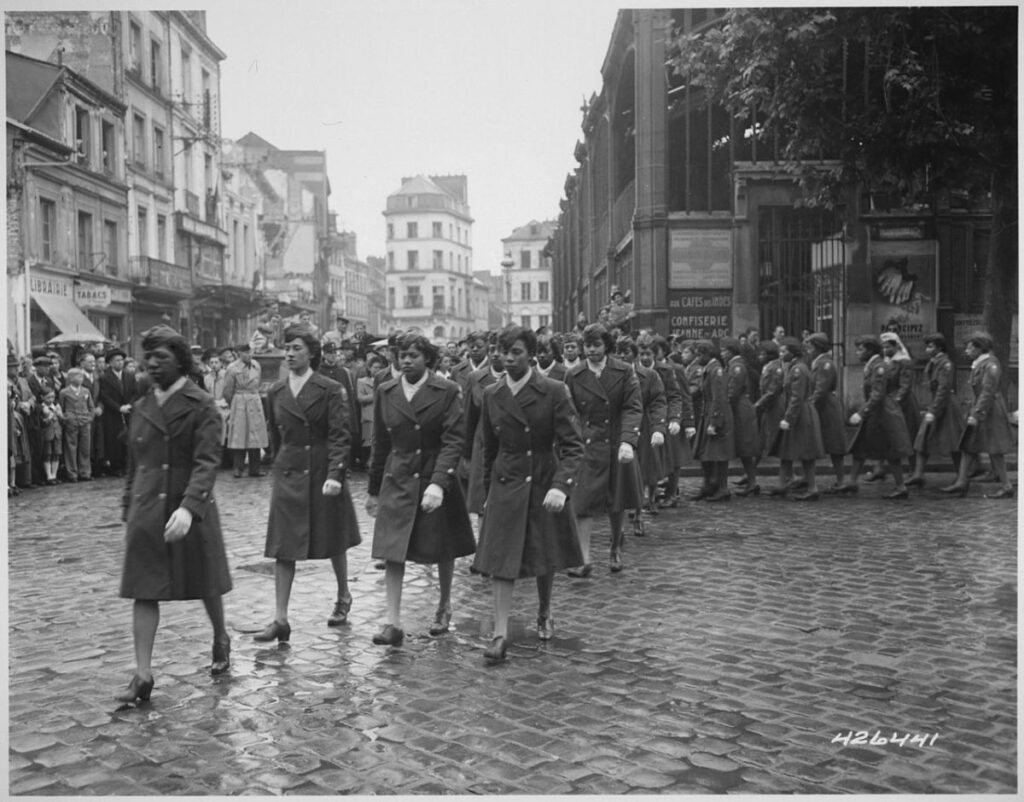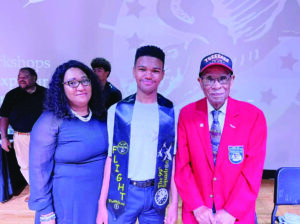Black female WWII unit recognized with Congressional Honor

by MICHAEL CASEY Associated Press
BOSTON (AP) — The House voted Monday to award the only all-female, Black unit to serve in Europe during World War II with the Congressional Gold Medal.
The 422-0 vote follows a long-running campaign to recognize the 6888th Central Postal Directory Battalion. The Senate passed the legislation last year. The unit, known in short as the Six Triple Eight, was tasked with sorting and routing mail for millions of American service members and civilians. Only a half-dozen of the more than 850 members are still alive.
“It’s overwhelming,” Maj. Fannie Griffin McClendon, who is 101 and lives in Arizona, said when told of the vote. “It’s something I never even thought about it. I don’t know if I can stand this.”
The 6888th Central Postal Directory Battalion was credited with solving a growing mail crisis during its stint in England and, upon their return, serving as a role model to generations of Black women who joined the military.
But for decades, the exploits of the 855 members never got wider recognition. But that has changed, starting several years ago.
A monument was erected in 2018 at Fort Leavenworth, Kansas, to honor them, and the 6888th was given the Meritorious Unit Commendation in 2019. A documentary “The Six Triple Eight” was made about them. There is talk of a movie. Retired Army Col. Edna Cummings was among those advocating for the 6888th.
“The Six Triple Eight was a trailblazing group of heroes who were the only all-Black, Women Army Corps Battalion to serve overseas during World War II,” said Wisconsin Rep. Gwen Moore, who sponsored the bill after being contacted by the daughter of 6888th members Anna Mae Robertson.
“Facing both racism and sexism in a warzone, these women sorted millions of pieces of mail, closing massive mail backlogs, and ensuring service members received letters from their loved ones,” she continued. “A Congressional Gold Medal is only fitting for these veterans who received little recognition for their service after returning home.”
The House also voted Monday night to the rename the Central Park Post Office in Buffalo as the “Indiana Hunt-Martin Post Office Building” after veteran Indiana Hunt-Martin, a member of the 6888th. Hunt-Martin died in 2020 at the age of 98.
“Throughout her life and military service, Indiana Hunt-Martin experienced racism and sexism firsthand, but no amount of discrimination prevented her from serving her country,” New York Democratic Rep. Brian Higgins, who sponsored the post office bill and also was a co-sponsor of the Congressional Gold Medal bill, said in a statement. “Her courage and bravery paved the way for future generations of African American women serving in the military.”
The 6888th was sent overseas in 1945, a time when there was growing pressure from African-American organizations to include Black women in what was called the Women’s Army Corps and allow them to join their white counterparts overseas.
The unit dodged German U-boats on their way to England and scrambled to escape a German rocket once they reached a Glasgow port.
They were deployed to unheated, rat-infested airplane hangars in Birmingham, England, and given a daunting mission: Process the millions of pieces of undelivered mail for troops, government workers and Red Cross workers. The mountains of mail had piled up and troops were grumbling about lost letters and delayed care packages. Thus their motto, “No Mail, Low Morale.”
They cleared out a backlog of about 17 million pieces of mail in three months — half the time projected. The battalion would go on to serve in France before returning home. And like so many Black units during World War II, their exploits never got the attention afforded their white counterparts.
Despite their achievements, the unit endured questions and criticism from those who didn’t support Black women in the military.
Housing, mess halls and recreation facilities were segregated by race and sex, forcing them to set up all their own operations. The unit commander, Maj. Charity Adams, was also criticized by a general who threatened to give her command to a white officer. She reportedly responded, “Over my dead body, sir.”
Many of the women had plenty of success after getting out of the military.
Elizabeth Barker Johnson was the first female to attend Winston-Salem State University in North Carolina on the GI Bill. She took part in the school’s graduation ceremony at the age of 99 — 70 years after getting her degree. Hunt-Martin worked for the New York State Department of Labor for 41 years.
McClendon joined the Air Force after the military was integrated and retired in 1971. She was the first female to command an all-male squadron with the Strategic Air Command. Another unit member, the late Doris Moore, became the first Black social worker in New Hampshire, her family said.
“This is a long-overdue honor and recognition for the women of the Six Triple Eight, including New Hampshire’s own Doris Moore,” New Hampshire Democratic Rep. Chris Pappas said in a statement. “Doris and her sisters in arms were trailblazers and patriots who answered the call to service. It’s even more remarkable that their sacrifice and service in defense of freedom came at a time when many of the very freedoms they fought for were not yet available to them.”








